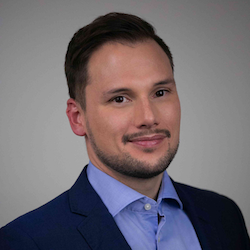
Florian Willomitzer, Research Assistant Professor of Electrical and Computer Engineering and Director of the 3DIM Lab, Northwestern University
Date and Time: Friday, April 1 at 3:00 p.m. CT
Location: Tech LR3 and Zoom
Zoom Link: https://tinyurl.com/CRBSeminar
• NU-authenticated attendees will be automatically admitted. Others, please email Amy Nedoss at amy.nedoss@northwestern.edu to be admitted from the waiting room.
Abstract:
Computational 3D imaging and 3D display principles are ‘enabling technologies’ that have the potential to foster transformational technical changes in the next decades. The list of possible future application scenarios is long: Novel breeds of cameras could see through tissue, fog, or around corners. Precise and fast 3D scanners could become essential for measuring and analyzing dynamic scenes during robotic surgery, autonomous navigation, industrial inspection, or cultural heritage applications. Portable medical 3D imaging and 3D display devices could effectively assist in diagnosis and therapy, e.g., of skin melanoma. Novel 3D display and eye-tracking methods could finally enable immersive AR/VR experiences. These are just a few examples.
In midst of these seemingly endless possibilities, the knowledge about fundamental physical and information-theoretical limits in imaging proves to be a powerful tool: By knowing that our imaging device already operates at the physical limit (e.g., of resolution), we can avoid unnecessary effort and investments in better hardware such as faster detectors, or cameras with higher pixel resolution. Moreover, limits often appear as uncertainty products, making it possible to optimize our system towards a specific quantity (e.g., speed) by trading in information less critical for the respective application. Although the imaging device is essential in this optimization, the central role is assumed by the illumination, which serves as encoder of the desired information.
In this talk, I will discuss the virtue of limits and merit of illumination modalities in computational 3D imaging systems using the examples of my research discussed above. Among other systems, I will introduce a novel method to image hidden objects around corners and through scattering media, and a ‘single-shot 3D camera’ for the motion-robust, precise, and dense 3D measurement of fast live scenes.
Bio:
Florian Willomitzer is a Research Assistant Professor at Northwestern’s ECE department and directs the Computational 3D Imaging and Measurement (3DIM) Lab. He graduated from the University of Erlangen-Nuremberg, Germany, where he received his Ph.D. degree with honors (‘summa cum laude’) in 2017. During his doctoral studies, he investigated physical and information-theoretical limits of optical 3D-sensing and implemented sensors that operate close to these limits.
At Northwestern University, Prof. Willomitzer works with his students and collaborators on novel methods to image hidden objects through scattering media or around corners, high-resolution holographic displays, unconventional methods for precise VR eye-tracking, and the implementation of high-precision metrology methods in low-cost mobile handheld devices. Moreover, the group develops novel time-of-flight and structured light imaging techniques working at depth resolutions in the 100μm-range.
Prof. Willomitzer is General Chair of the OSA COSI conference, Optics Chair of the IEEE ICCP conference, and served/serves as reviewer for OSA, SPIE, IEEE, CVPR, and the Nature Portfolio. He is recipient of the NSF CRII grant and his Ph.D. thesis was awarded with the Springer Theses Award for Outstanding Ph.D. Research.
Audience
- Faculty/Staff
- Student
- Graduate Students
Interest
- Academic (general)